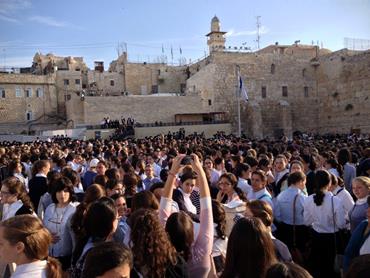Torah, Avodah, Gemilut Chesed
 Had a nice write-up in the Toledo Blade on an inter-faith program I sponsored last Wednesday night, so I’m re-posting it here. Next week we have a program at the cathedral on prayer, and on May 30 we have a program at the Islamic Center on acts of kindness/charity. Reb Barry
Had a nice write-up in the Toledo Blade on an inter-faith program I sponsored last Wednesday night, so I’m re-posting it here. Next week we have a program at the cathedral on prayer, and on May 30 we have a program at the Islamic Center on acts of kindness/charity. Reb Barry
Clergy of three faiths find common ground
Christian, Muslim, Jewish leaders join in holy-books forum
BLADE RELIGION EDITOR (David Yonke)
"They’re not just books."
The Torah, the Bible, and the Qur’an were written by man but inspired by God, and are "instruction manuals for life," according to religious leaders from the local Jewish, Christian, and Muslim faiths in a public forum Wednesday night.
Rabbi Barry Leff, the Rev. Michael Billian, and Imam Farooq Abo-Elzahab spoke for 20 minutes each, followed by questions and answers from the audience, about their particular religion’s views on the Scriptures.
A small crowd, about 30 people, attended the forum held in the sparkling new sanctuary of Congregation B’nai Israel, the Conservative Jewish synagogue that moved from Kenwood Boulevard to Sylvania in January. The congregation will dedicate its new building with a series of events next weekend.
A second forum will be held at Rosary Cathedral at 7:30 p.m. Wednesday and the third will be at the Islamic Center of Greater Toledo on May 30.
In a broad sense, Rabbi Leff said in opening the discussion, the Torah represents all Jewish learning, and in a narrow sense, it comprises the Pentateuch – the first five books of the Bible.
It is so important that if one letter in a Torah scroll is found to be incorrect, the entire Torah cannot be used until that error is fixed, he said.
While the Torah contains explicit commandments, Jews should go beyond the letter of the law and follow the spirit of the Torah, Rabbi Leff said.
Interpretations of the Torah cover the spectrum, Rabbi Leff said, from fundamentalist Jews who believe the Earth was created 5,767 years ago, to those who consider the Torah as containing inspired truths but not a book to be taken literally.
"My view is that at the heart of Torah, it represents an encounter between God and man," he said.
The New Testament, for example, written after the birth of Jesus Christ, contains 305 references to the Old Testament, he said.
Wearing a pale yellow yarmulke out of respect for Jewish tradition and his black priest’s garb, Father Billian said there are four elements to Scripture: It is sacred, canonical, inspired, and inerrant.
He said the Catholic Bible’s lineup of 46 Old Testament books and 27 New Testament books was decided in 1546 at the Council of Trent, where bishops from around the world chose which books to include and which to exclude.
The Catholic Church displays its reverence for the Bible at every Mass, Father Billian said. After the holy book is carried in with great ceremony, the priest kisses it and incense is burned to show honor.
"They become the proclaimers of the Word by the way they live their lives," Father Billian said.
The revelations came over a 23-year period, he said, in Mecca and Medina, in modern-day Saudi Arabia. The Prophet, who was illiterate, memorized the verses, which are divided into 114 chapters as short as three verses and as long as 286.
Mohammed recited the verses to scribes, and had them read them back for accuracy, the imam.
The presentation ended with the three clergymen discussing their observations from the others’ lectures.
The clergy and audience members continued with informal interfaith discussions while enjoying refreshments for more than an hour after the lectures concluded.

